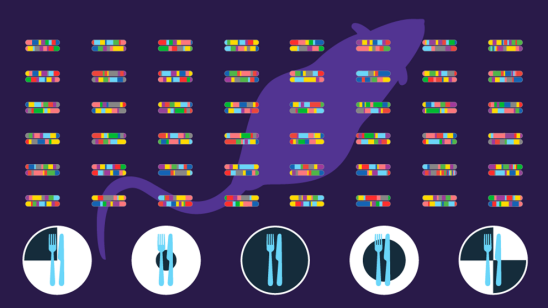
For nearly a century, laboratory studies have shown that if animals eat less food or eat less often, they tend to live longer. However, scientists haven’t fully understood why these restricted diets help extend lifespan or how to best apply them to humans. Now, in a much-awaited study, researchers from The Jackson Laboratory (JAX) and their partners followed nearly a thousand mice on different diets to learn more about these questions.
Gary Churchill is the professor at JAX who led the study. Churchill and his team gave female mice five different diets: one in which the animals could eat as much as they wanted anytime, two in which the animals got only 60% or 80% of their usual amount of food each day, and two in which the animals didn’t get any food for one or two days a week but could eat as much as they wanted on the other days. Then, they watched the mice for the rest of their lives, checking their blood and overall health regularly.
On average, mice that could eat as much as they wanted lived for about 25 months. Mice on the intermittent fasting (间歇性禁食) diet lived for around 28 months, those eating 80% of their usual amount lived for about 30 months, and those eating only 60% lived for 34 months. However, within each group, there was a big difference in how long the mice lived; for example, some mice eating the least food lived just a few months, while others lived up to four and a half years.
The study found that eating fewer calories made mice live longer than fasting every other day. Surprisingly, the mice that lived the longest on the restrictive diets were those that lost the least weight despite eating less. Animals that lost the most weight on these diets tended to have low energy, weaker immune systems, weaker reproductive systems, and didn’t live as long.
原创编写 版权所有 侵权必究! 每日更新 个性化阅读 英语飙升!
1.1. What is the main purpose of the study?
A To determine the best diet for mice.
B To understand how restricted diets extend lifespan in animals.
C To apply these diets to human lifespan extension.
D To compare the health of mice on different diets.
解析:选B。细节理解题。根据第一段的“However, scientists haven’t fully understood why these restricted diets help extend lifespan or how to best apply them to humans.”和“researchers from The Jackson Laboratory (JAX) and their partners followed nearly a thousand mice on different diets to learn more about these questions”可知,科学家们尚未完全理解限制性饮食如何帮助延长寿命,以及如何最好地将这些饮食应用于人类。因此,研究人员进行了相关研究以了解更多关于这些问题。故选B。
2.2. What did Gary Churchill and his team do with the female mice in their study?
A They fed them a single type of diet.
B They let them eat as much as they wanted.
C They tracked them on a variety of diets.
D They didn’t feed them for two days a week.
解析:选C。细节理解题。根据第二段的描述可知,Gary Churchill和他的团队给雌鼠提供了五种不同的饮食方案,包括一组自由进食,两组分别摄入基础热量的60%、80%,另两组采取间歇性禁食,每周连续禁食1天或2天,然后对小鼠进行终身研究。故选C。
3.3. Based on the study, which group of mice tended to have the shortest lifespan?
A Mice that could eat as much as they wanted anytime.
B Mice that got only 60% of their usual amount of food each day.
C Mice that didn’t get any food for one or two days a week.
D Mice that were given 80% of their usual amount of food each day.
解析:选A。细节理解题。根据第三段内容可知,平均而言,可以随意进食的小鼠寿命约为25个月,而接受限制饮食的小鼠寿命更长。因此,可推测那些可随意进食的小鼠倾向于拥有最短的寿命。故选A。
4.4. What type of writing is this text?
A An art show review.
B An exhibition guide.
C An advertisement.
D A research report.
解析:选D。推理判断题。本文主要介绍了杰克逊实验室(JAX)的研究人员追踪了近千只不同饮食的小鼠的健康状况,最终得出结论:吃更少的食物或经常吃的少的动物寿命更长。故选D。